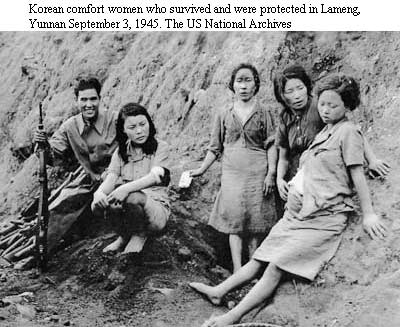'Comfort women' still controversial in Japan, S. Korea
Eriko Ikeda is fighting a battle against time as she tries to keep a small museum in Tokyo's Nishi-Waseda neighborhood dedicated to the former "comfort women" open.

Ikeda, the head of the Women's Active Museum on War and Peace, says more people are denying the government's and military's involvement in forcing Korean and other Asian women to provide sex for Japanese soldiers before and during World War II.
"As the victims get older and pass away one after another, it's as if their tragic memories are also disappearing," the 61-year-old says. "Somehow, I want to keep telling people the facts about the war by exhibiting their grave testimony and these materials."
In 2005, the nonprofit organization Women's Fund for Peace and Human Rights opened the museum in a room in a building to inform the public about the suffering of former comfort women.
The number of visitors to the museum has fallen off in recent years, and its finances are in poor shape. Although July 6 marked the 20th year since the Japanese government officially acknowledged that the state was involved in the recruitment of comfort women, there is a growing movement in Japan that denies the state's involvement.

The museum features materials, including 155 photos of the faces of former comfort women from the Korean Peninsula and other Asian countries, as well as testimonial videos. Also on display are Japanese Imperial Army rules on wartime brothels and copies of official Ministry of Interior documents requesting the governors recruit comfort women.
When the museum opened, there were 2,706 visitors, which peaked at 3,224 in 2007. It garnered attention after the backlash in Japan and abroad against Prime Minister Shinzo Abe's statements about the comfort women issue. Abe publicly stated there was no evidence that comfort women were forcibly taken by the military. He later had to issue an official apology because the Japanese government already confirmed in 1992 that the wartime government was involved in the brothels.
Even so, visitor numbers have dropped below 2,000 in the past three years, with only 1,843 coming last year. The museum is now in the red.
Among the museum's visitors are university students who come to study the comfort women issue for their seminars. Some have even published books. However, some male students have written messages in the museum's guestbook, such as "the comfort women were just trying to make money" and "Japan doesn't need to apologize or pay compensation."
In Palisades Park, New Jersey, there is a small monument dedicated to the memory of the women abducted by the Imperial Japanese Army. A town of 20,000 people where about half the population is of Korean ancestry, the stone memorial was championed by a local Korean-American civic group. Dedicated in 2010, the monument has an inscription that says the Japanese Imperial Army abducted the comfort women.
In May, four Diet members of the Liberal Democratic Party visited the city's mayor to demand the monument's removal. Eriko Yamatani, a member of the Upper House, asserted that "there is no truth (to the claim that) the army organized the abduction of women."

The Palisades Park authorities flatly denied the demand for the monument's removal. The incident only deepened the animosity between Japanese and Koreans over the long-standing contentious issue.
In June, a Japanese man tied a protest stake to the statue of a comfort woman that stands across from the Japanese Embassy in Seoul. The stake read: "Takeshima is Japan's territory." The Takeshima islets, known as Dokdo in Korean, is claimed both by Japan and South Korea. The image was viewed by tens of thousands of people on the Internet.
Elsewhere, in Tokyo's Shinjuku district, a photo gallery about former comfort women caused an uproar when groups that deny Japan's responsibility for World War II, among others, expressed their opposition to its opening. Due to their protests, Nikon Corp., the venue's owner, decided to cancel the exhibition, but a court injunction ordered it not to.
No comments:
Post a Comment